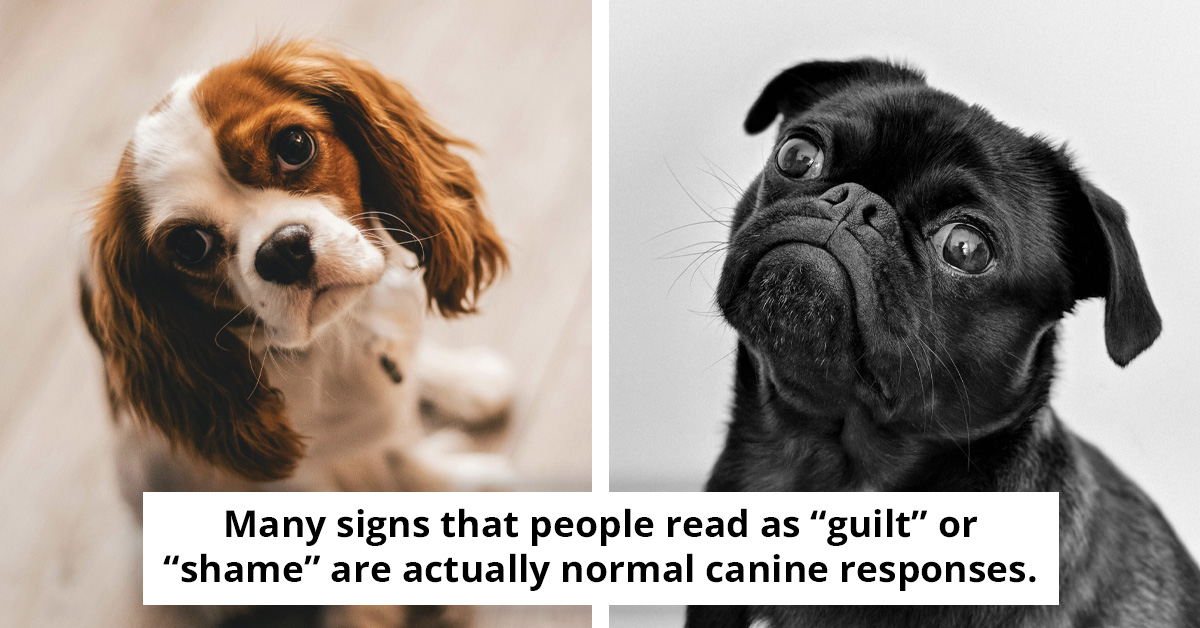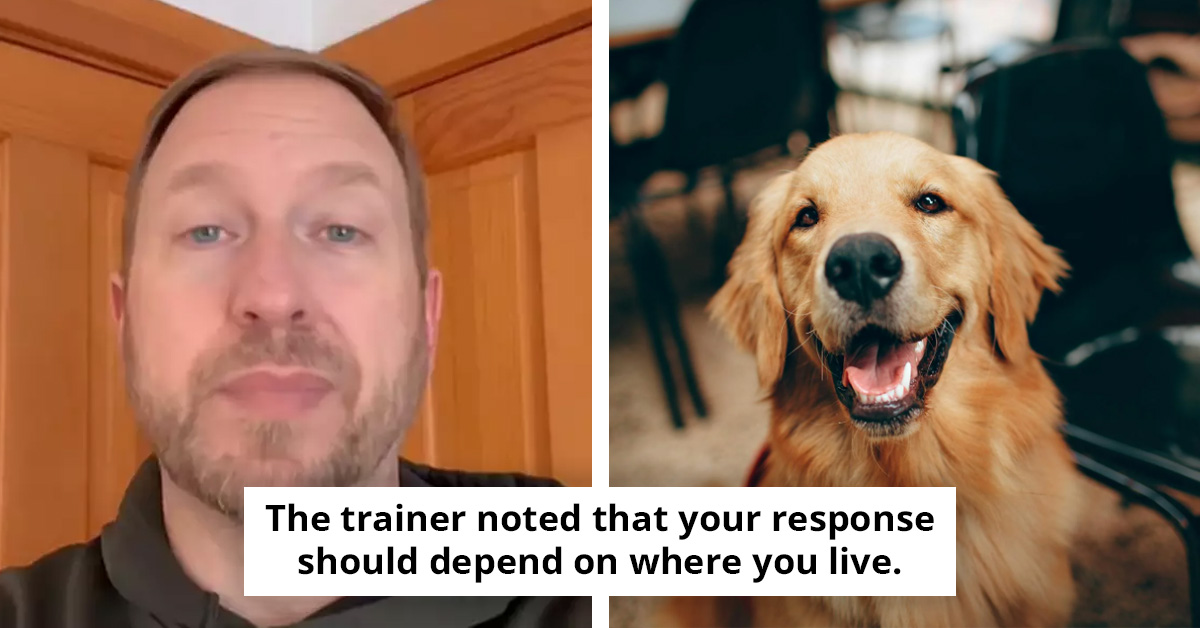"You Don't Look Disabled" - Redditor With Service Dog Challenged For Using Disability Seat On Bus
We're back at it again with another AITA post from Reddit where we will look at a submitted post from someone who is trying to see if they are in the wrong or not for something. This thread is perfect for people who need an outside opinion or want to get someone else's perspective on their situation.
We've looked at many posts from this thread because they are usually pretty entertaining and there are usually a lot of interesting comments on the posts as well. So with this being said, we're looking at a post today that was submitted by a man who wants to know if he's wrong for sitting in the disabled seats on the bus.
People on the bus immediately started talking about how it was wrong to sit in a disabled seat when he wasn't disabled, and elderly people could sit instead. The guy didn't necessarily look disabled, but he was and so he snapped back at the people talking about it.
OP wants to know if he's TA for sitting in this seat or if he had a valid reason to be sitting in that spot. If you're interested in hearing more about this story then keep on reading as we dive in and give you a look into the full post.
OP starts of his post by explaining that he has disabilities but doesn't "look" like he does.

People always assume he's disabled because of his dog but clearly not this time.

Understanding Disability Perception
Social psychologists explain that perceptions of disability are often influenced by societal stereotypes and misconceptions. According to research published in American Psychological Association, individuals with invisible disabilities, such as mental health conditions or chronic pain, frequently face skepticism about their needs.
These biases can lead to social exclusion and emotional distress, as those who experience these conditions feel invalidated. For example, studies show that individuals often assume visible cues dictate someone's level of disability, which can exacerbate feelings of isolation and frustration.
He explains where he sits at normally when on the bus.

Then he gets into the story of when he rode the bus and people were petting his dog.

The Importance of Advocacy
Advocacy plays a crucial role in reshaping perceptions about disabilities. According to Dr. Susan H. Kahn, advocacy efforts can significantly influence public policy and social attitudes towards individuals with disabilities. Her research underscores the importance of collective action in creating systemic change.
By engaging in advocacy, individuals can educate others, challenge stereotypes, and promote inclusivity. This proactive approach not only benefits those with disabilities but enriches society as a whole, fostering a culture of acceptance and understanding.
He did the appropriate thing that many service dog owners do.

This is when people started talking about him not being disabled and how he shouldn't be sitting there.

Understanding Disability and Public Perception
The phrase 'You don’t look disabled' reflects a widespread misunderstanding about disability that can lead to stigma and discrimination. Research in social psychology indicates that societal perceptions of disability are often rooted in stereotypes and misconceptions. Individuals who possess invisible disabilities may face particularly difficult challenges, as their conditions are not immediately obvious to others.
Studies have shown that the lack of visible signs can lead to assumptions about an individual's capabilities and needs, which can be damaging to their self-esteem and social interactions.
OP responded to them but he wants to know if he's in the wrong for sitting there or not.

People truly think disabled means that you need to be visually unable to move or something - not true.
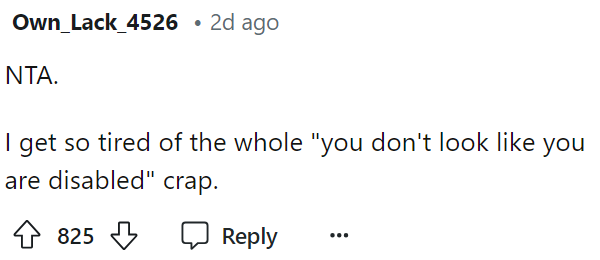
Understanding Disability and Societal Perceptions
The conflict surrounding the use of a disability seat on public transport highlights significant issues related to societal perceptions of disability. Dr. Tom Shakespeare, a prominent disability researcher, emphasizes that societal attitudes often dictate how disabilities are recognized and validated.
This can lead to individuals with invisible disabilities facing skepticism and challenges that those with visible disabilities may not encounter, creating a complex landscape for validation and acceptance.
People should definitely understand this, but they just don't.
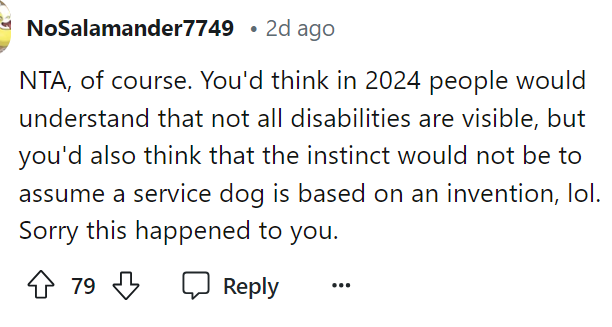
Assuming someone doesn't (or does) have a disability is just not okay all around.
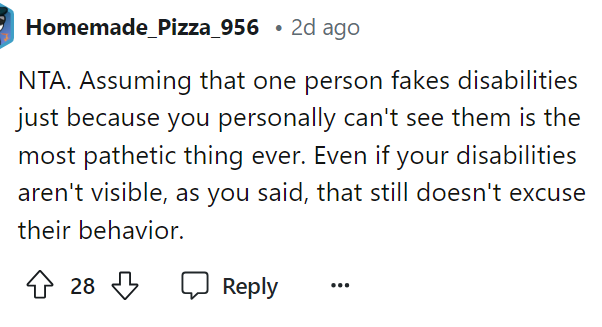
Research highlights the concept of 'ableism' - a belief that prioritizes able-bodiedness as the norm. This ideology often marginalizes individuals with disabilities, leading to discrimination and lack of support. A clinical psychologist noted that this systemic bias can affect the mental well-being of those facing challenges.
To combat ableism, fostering an inclusive environment is crucial. Encouraging empathy and awareness through educational programs can significantly enhance understanding and acceptance, paving the way for better societal integration for individuals with disabilities.
People are definitely rude and a lot of them "wish" they were disabled for the fake benefits they think people get.

People on this bus were clearly out of their minds because they were out of line form the beginning.
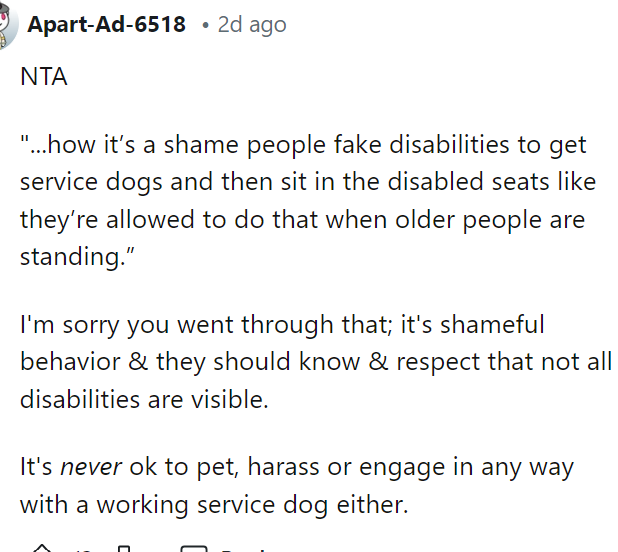
Experts in disability advocacy emphasize the importance of raising awareness about the diverse experiences of individuals with disabilities. According to research from the National Council on Disability, misconceptions can lead to barriers in accessing necessary resources and support. Educating the public about invisible disabilities can help dismantle these stereotypes and promote greater understanding and acceptance.
Initiatives focusing on inclusive education and community engagement are critical for fostering a more supportive environment for individuals with disabilities.
It's interesting to see that people who are in the comments are totally supportive of OP here.

People don't really understand anything when it comes to disabilities honestly.
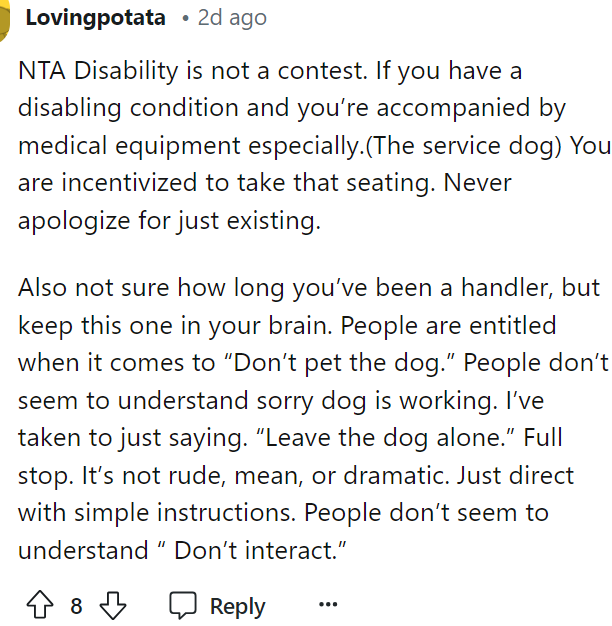
Research from the American Psychological Association indicates that stigma surrounding disabilities can lead to feelings of invisibility and isolation among individuals who do not fit traditional notions of disability. This stigma can exacerbate emotional distress, making it essential to address these societal perceptions to foster a more inclusive environment.
Understanding the psychological impact of these perceptions is crucial for both individuals with disabilities and the general public.
They absolutely do need to shut up because they don't know what they are talking about.
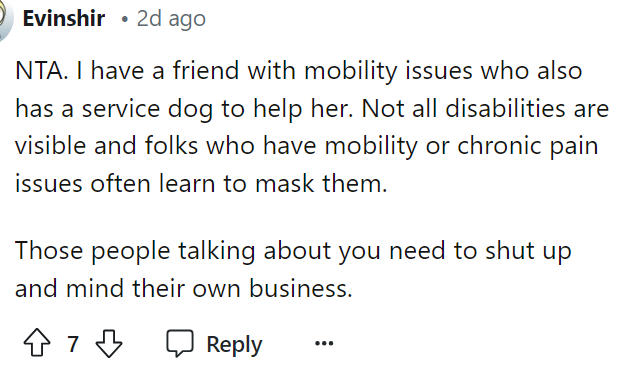
They most definitely should've been minding their business.
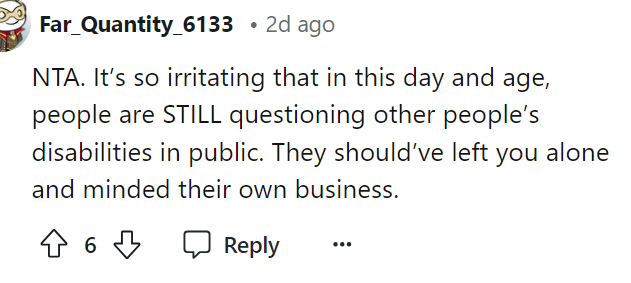
The Role of Empathy in Social Interactions
Empathy is vital in social interactions, especially when addressing issues surrounding disability. Research by Dr. Brené Brown emphasizes that empathy fosters connection and understanding, which can mitigate feelings of isolation.
According to her studies, when individuals actively listen and validate others' experiences, they create a supportive atmosphere that encourages open dialogue. This approach can be particularly beneficial in situations where misunderstandings arise, promoting a sense of community and belonging among individuals with disabilities.
Say it louder for the people in the back.

This is exactly the point that OP was trying to make.
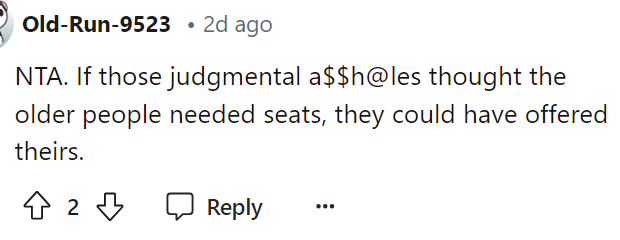
Navigating Public Spaces: Strategies for Individuals with Disabilities
For individuals with disabilities, navigating public spaces can be fraught with challenges. Research published in the Journal of Disability Policy Studies indicates that many people with disabilities experience anxiety about judgment or confrontation when using accessible resources. To combat this, individuals might benefit from developing assertiveness skills to navigate public interactions effectively.
Practicing scenarios where they may need to assert their rights can empower individuals and help them feel more confident in public settings.
Psychological Analysis
This scenario highlights the common misconception that disabilities are always visible. When they're not, people often question the legitimacy of the person's disability, leading to social discomfort and potential discrimination. It's essential to remember that not all disabilities are apparent and avoid making assumptions based on appearances.
Analysis generated by AI
The Importance of Advocacy and Awareness
Advocacy plays a vital role in reshaping societal perceptions of disability. Dr. Judith Heumann, a disability rights activist, emphasizes the importance of raising awareness about the diversity of disabilities and the need for inclusive practices in public spaces.
Engaging in advocacy efforts can empower individuals with disabilities to assert their rights and promote understanding among the general public, reducing stigma and fostering acceptance.
Understanding the psychological impact of stigma is crucial in addressing disability discrimination. The stigma surrounding disabilities can lead to internalized negative beliefs, affecting self-esteem and mental health. Research indicates that individuals who experience stigma are more likely to face anxiety and depression.
Supportive interventions, such as group therapy and peer support networks, have shown promise in mitigating these effects. By providing safe spaces for individuals to share their experiences, they can foster resilience and reduce the psychological burden associated with stigma.
Additionally, support groups can provide invaluable resources for individuals facing similar challenges. Studies show that social support can significantly enhance emotional resilience and coping strategies among individuals with disabilities. Connecting with others who share similar experiences can foster a sense of community and belonging, which is beneficial for mental health.
Such groups can also serve as platforms for sharing resources, strategies, and advocacy efforts that promote inclusion and understanding.
Creating educational programs that highlight the various forms of disabilities can help combat stigma in public spaces. These programs can facilitate discussions about the importance of inclusion and respect for all individuals, regardless of their visible or invisible disabilities.
Moreover, implementing training for public transport staff on how to handle situations involving individuals with disabilities can enhance the overall experience and reduce conflict.
Navigating Public Spaces with Disabilities
Experiencing challenges in public spaces can significantly affect individuals with disabilities. Research published in the Journal of Accessibility and Design for All highlights that accessibility barriers not only hinder mobility but also impact emotional well-being.
To enhance public spaces, urban planners and policymakers should prioritize inclusivity by integrating universal design principles. This approach ensures that environments cater to diverse needs, promoting equitable access and reducing the stigma associated with disabilities.
Building Empathy in Public Spaces
Fostering empathy among the general public is crucial for creating an inclusive environment for individuals with disabilities. Research shows that empathy can significantly reduce prejudice and stigma, leading to a more supportive community.
Encouraging open dialogues about disabilities can help break down barriers and facilitate understanding, creating a more compassionate environment for all.
Building awareness around the complexities of disability can foster a more inclusive society. Educational initiatives that promote understanding of both visible and invisible disabilities can break down stereotypes. Research shows that increased knowledge leads to reduced prejudice and improved social attitudes.
Implementing training programs in schools and workplaces can equip individuals with the skills to support their peers effectively. Such initiatives not only validate the experiences of those with disabilities but also encourage advocacy and allyship in broader social contexts.
People came quickly to the comments to tell OP that he was NTA in this situation because he is actually disabled. People really need to stop calling people out on unseen disabilities.
Not every disability has to be something that you can visually see and most of them actually aren't visible.
Solutions & Coping Strategies
Understanding the psychological aspects of disability perception is vital in fostering a more inclusive society. Research consistently shows that empathy, advocacy, and education can significantly reduce stigma and promote acceptance.
By creating supportive environments and challenging societal norms, we can empower individuals with disabilities and encourage open dialogue. Ultimately, embracing diversity benefits everyone, paving the way for a more compassionate and equitable world.
